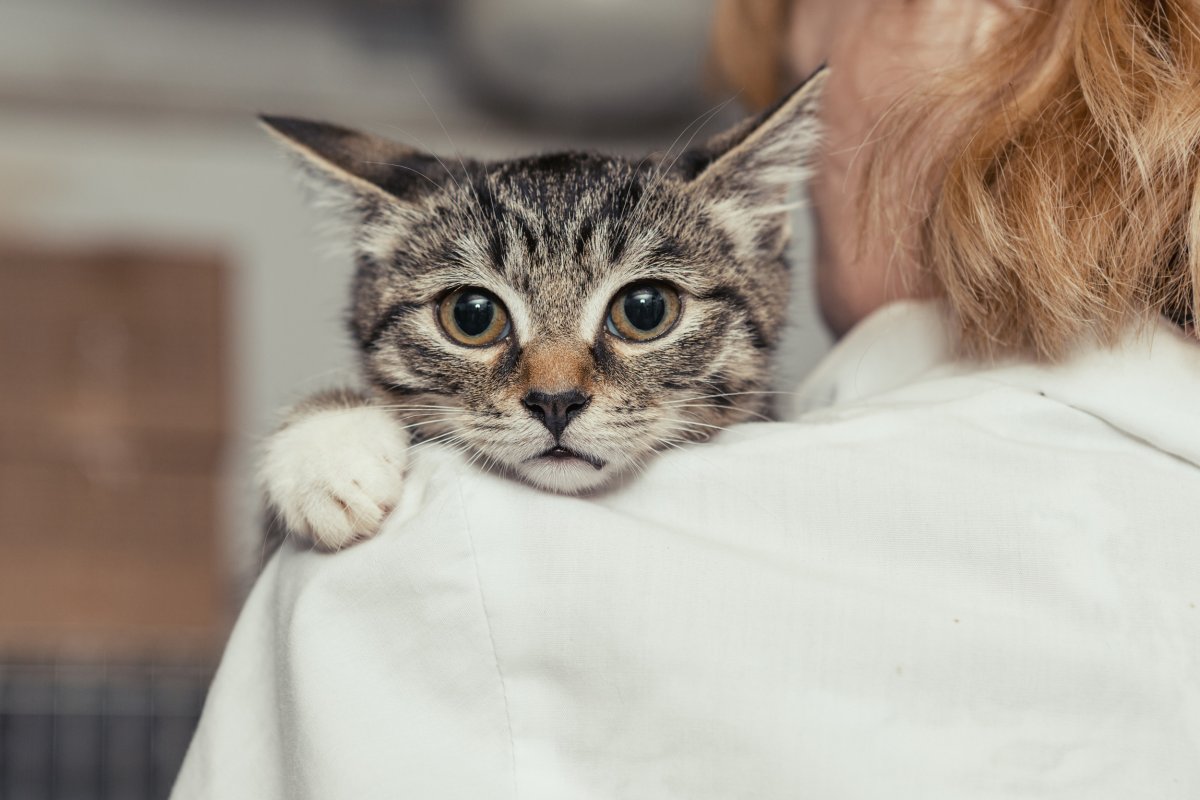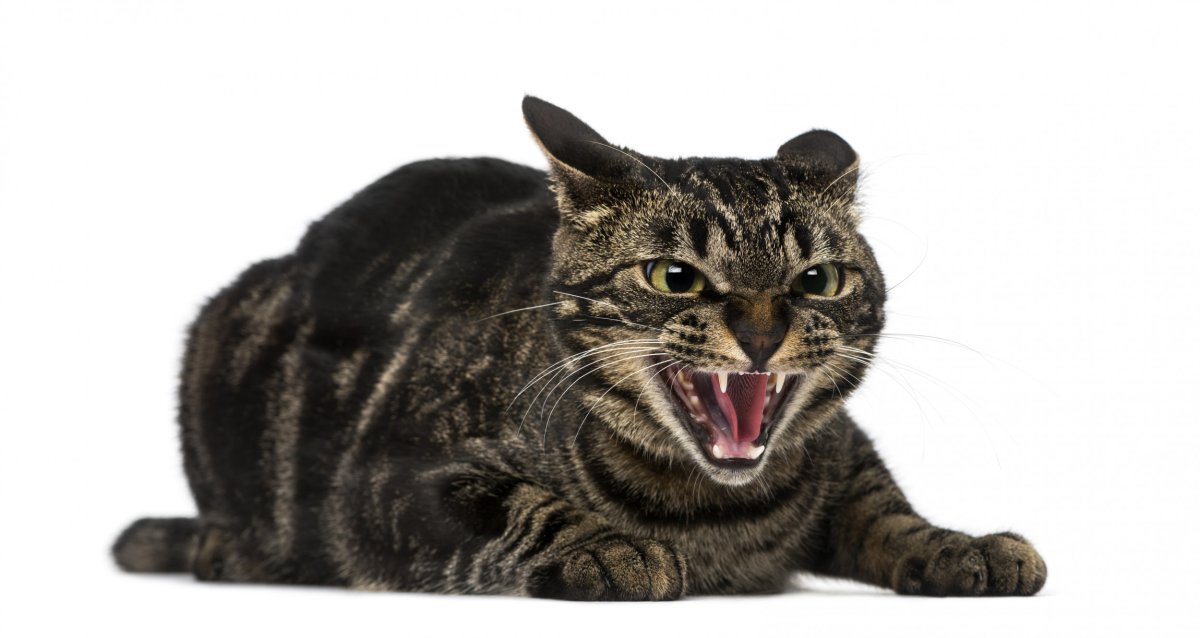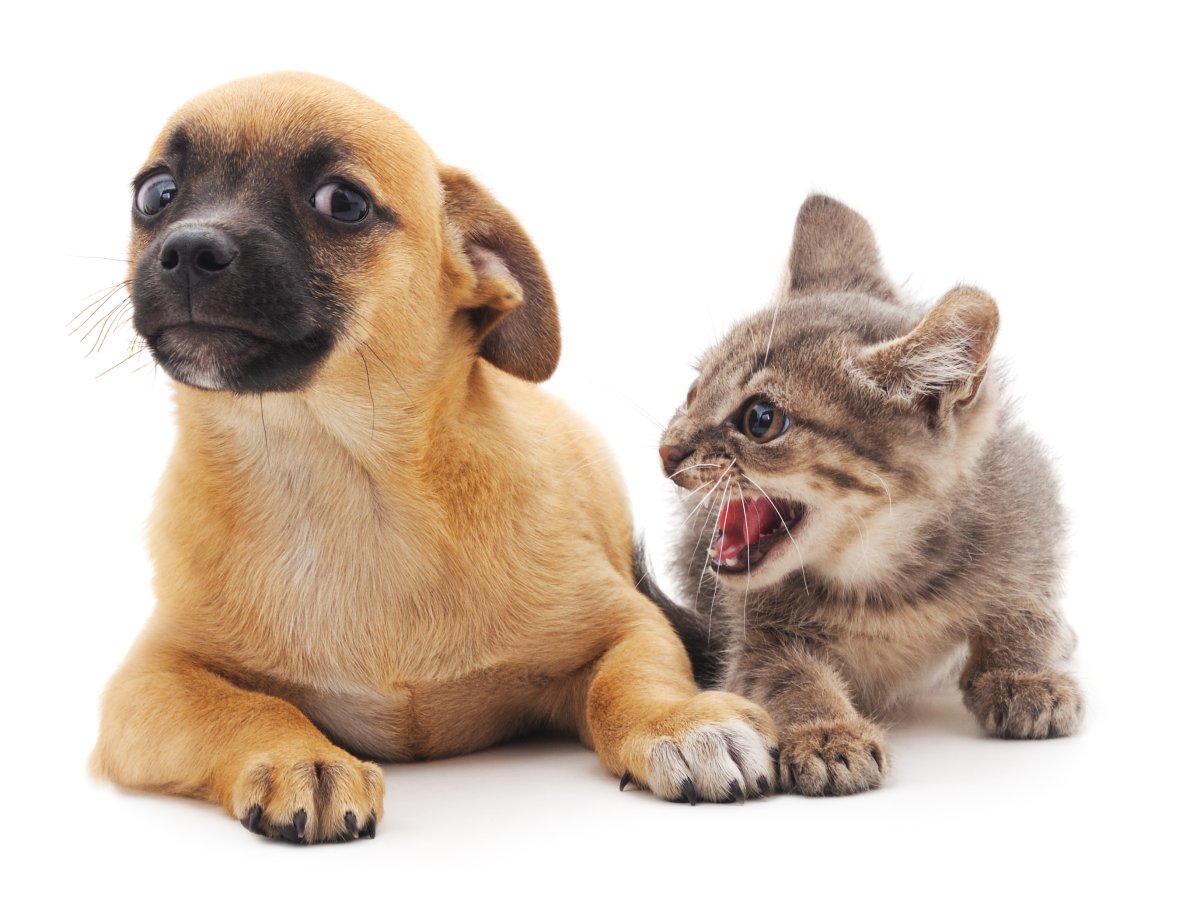Feeling disturbed by the kitty you've had for years who keeps hissing at you and others? Pet owners need not be alarmed, cat hissing isn't necessarily cause for concern and is actually normal cat behavior.
A cat hiss is a drawn-out, low intensity sound produced by a long exhalation from the feline, with their mouth open and teeth exposed. It is a very short sound and can stop suddenly.
Hissing is accompanied by a change in body posture. You'll see the cat with their ears flattened to the side of the head, an arched back and their fur standing on end.
But why do cats hiss at us and other animals? Newsweek asked the experts.
Why Do Cats Hiss?
A cat's hissing sound is involuntary and triggered by "the surprise appearance of an enemy," a January 2020 study on feline behavior explained. "The sound is produced mostly in agonistic situations in order to warn an opponent."
Author Pam Johnson-Bennett from Cat Behavior Associates told Newsweek, the defensive sound indicates the cat is scared and feels threatened. "Cats try to avoid physical confrontations so they use vocal warnings, in combination with body posturing to deter the opponent."

Is Hissing a Sign of Aggression?
It's important to note that hissing is not aggressive behavior but rather a sign that the cat is unhappy with something, Graham J. Lewis, a veterinary surgeon from the Paragon Veterinary Group, told Newsweek.
"It is usually a warning before any aggression and if you are able to understand this then the situation can be deescalated before the cat becomes aggressive," he explained.
As it is a defensive form of communication, the hissing sound shows the cat does not want to engage and is hoping the threat will back off, Johnson-Bennett added.
While hissing is not an indication of aggression, it can be a sign your cat will attack if they continue to be provoked.
Why Is My Cat Hissing at Me?
Hissing is an important mode of communication for your feline friends and indicates the cat is unhappy with a situation, Zazie Todd, the author of the forthcoming book PURR: The Science of Making Your Cat Happy, told Newsweek.
Feeling threatened
If your cat hisses at you or other humans, they may feel threatened by you or others at that moment or because of the way they are being handled.
Lewis explained: "This is usually because they are feeling threatened in some way. This might be something you are doing that is irritating your cat or they are wanting some space and to be left alone at that time."
For example, a cat may hiss while you're trying to get them into a carrier for a visit to the veterinarian's office. The kitty may also hiss while being restrained by staff during examinations or treatments while there.
Cats may even hiss at familiar animals or people if the immediate circumstances make them feel threatened, Johnson-Bennett noted.
Fearing the Unfamiliar
Some cats hiss due to a fear of new and unfamiliar people and objects in their home environment, which throws them off.
Rachael Myers, Animal Behaviourist at U.K. pet charity Blue Cross told Newsweek: "If you are doing something to your cat and they hiss at you it's important to listen to this and stop what you are doing."
To help ease their fear, owners can try "systematic desensitization with counter-conditioning," Dr. Marci Koski, a certified feline behavior and training professional with Feline Behavior Solutions in Vancouver, Washington, explained to PetMD.
This entails gradually exposing your feline friend to low levels of whatever it fears (be that a person or an object), while providing positive reinforcements, such as treats or affection.
"With time, the hissing will decrease, and your cat will feel more comfortable with his home and its inhabitants," Koski said.

Stress
Cats do not cope well with stress, so the hissing could potentially be connected to stressors in their environment. They can sometimes be stressed out by loud noises and "quick, sporadic movements," Alana Stevenson, a certified animal behaviorist based in Boston, explained in the PetMD article.
It is not uncommon for cats to react defensively to stress by hissing.
Physical Pain
While it is less common than other reasons, your cat could be hissing because of pain, Lewis said. This can be especially the case if they're being touched at the location of their pain.
For example, cats with arthritis may hiss when jumping off a chair or moving in a way that worsens their pain.
Cats Hissing at Kittens
Just like humans, cats can be very protective of their little ones, so don't be surprised if your cat hisses around her newly born kittens. "Mother cats will hiss if someone comes too close to their kittens," Koski said.
Myers highlighted cat's less than social nature: "[They] often do not want to be in close contact with other cats, they may hiss at the cat or kitten to communicate this and to avoid conflict."
Why Is My Cat Hissing at Other Cats?
Cats may also hiss "for territorial reasons and can be the start of cats fighting with one another," Lewis said.
Cats hissing at each other in the house may indicate they aren't getting along very well, according to Todd.
"Cats shouldn't have to compete with each other for resources, so in a multi-cat home, always make sure each cat has access to their resources," the author said.
Todd advises keeping one litter box per cat plus one spare. Each cat should have their own food and water dishes and they shouldn't have to eat next to each other. "This can help to reduce the tension."

Why Is My Cat Hissing at a Dog?
A cat hissing at a dog is likely feeling threatened, according to Lewis. "Often with time, cats can become good friends with dogs and will tolerate them well. However, a very boisterous dog will scare a cat initially." he explained.
Myers agreed: "If your cat is hissing at your dog your cat is likely to be communicating that they want space from your dog or feels threatened by your dog's presence. It is so important for cats to feel safe, so you would need to take steps to manage your dog from frightening your cat."
In these cases, controlled introductions—where the cat has escape options and safe places (possibly up high) they can access—can help the pets accept one another better.
Assuming the dog is safe and the cat is not at any risk, it's important to make sure the cat has places they can go that the dog can't access, according to Todd.
For first meetings Myers recommends a few things to make your cat feel more secure.
"Set up a Feliway plug in before you bring your new pet home. Before introducing face to face you can exchange bedding between the pets, and "scent swap" by stroking your new pet's head with a soft cloth, before dabbing this around the home and furniture to mix with you existing pet's scent."
"When you feel you are ready to introduce them, exercise your dog first, and have them on a lead with some tasty treats – it's really important your dog doesn't have an opportunity to chase your cat as this could damage the chances of any positive relationship developing."
Find more tips on introducing cats and dogs here.
What Should I Do When My Cat Hisses?
Pet owners should try to understand whether is something you're doing that might be irritating your cat. "Give them space and ensure they have somewhere they feel safe," Lewis said.
Those who may be worried that their cat is in pain should look for other signs of pain, such as "lameness, lethargy or inappetence" and contact a veterinarian if they are concerned, he advised.
You should never tell the cat off or punish them for hissing. "Instead, see it as them saying 'back off' or 'stop that'. Think about things from their perspective and try to see if they are unhappy," Todd said.
If your cat is hissing due to reluctance towards certain routine tasks (like grooming them or putting them in their cat carrier to go to the veterinarian's office), devise a plan to gradually train them to actually like that activity, the author advised.
Gently wrapping your cat in a towel can facilitate getting them in the carrier for veterinarian visits. You should also consult your veterinarian for suggestions on how to make the trips easier.
"A lot of people think cats can't be trained, but they can. You just have to be patient, follow a gradual plan" and there will be "great rewards," Todd said.

Uncommon Knowledge
Newsweek is committed to challenging conventional wisdom and finding connections in the search for common ground.
Newsweek is committed to challenging conventional wisdom and finding connections in the search for common ground.
About the writer
Soo Kim is a Newsweek reporter based in London, U.K. She covers various lifestyle stories, specializing in travel and health.
Soo ... Read more
To read how Newsweek uses AI as a newsroom tool, Click here.








